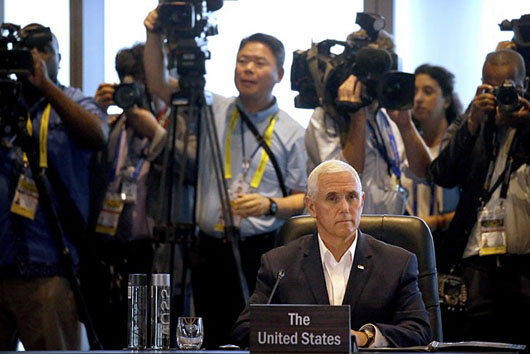Special to WorldTribune.com
Although military flash points in the Japan Sea and the South China Seas as well as the Bab el Mandeb Strait [between the Indian Ocean and the Red Sea] appear to be calmer, relations between Washington and Beijing are deteriorating.
This is due to a growing trade war between the two giants. This is also in no small part due to Beijing’s controversial Belt and Road Initiative [BRI], the world’s largest infrastructure investment scheme to date.

The BRI is a multi-billion-dollar initiative launched by Chinese President Xi Jinping when he came to power in 2013 aiming to link Southeast Asia, Central Asia, the Gulf region, Africa and Europe with a land and sea route to China.
“We encourage China to promote an uphold internationally accepted best practices and infrastructure development and financing and to adopt an open and inclusive approach to its belt and road initiative, especially these overseas infrastructure projects,” Brian Hook, Director of Policy Planning to the Secretary of State, said responding to Beijing.
But his comment came ahead of Secretary of State Mike Pompeo’s announcement during the first Indo-Pacific Business Forum hosted by U.S. Chambers of Commerce in mid-July, an initiative by the Trump administration meant to advance collaboration between the United States and Indo-Pacific nations.
The two countries declared a trade war in mid-November when they met at the Asia-Pacific Economic Cooperation (APEC) summit in Papua New Guinea. The scheduled weekend of diplomacy meant to defuse trade tensions, instead set Xi and Pence attacking each other’s positions.
“Know that the U.S. offers a better option,” Pence told APEC. “We don’t drown our partners in a sea of debt, we don’t coerce, compromise your independence. We do not offer constricting belt or a one-way road.”
“As President Trump said …we have great respect for President Xi… [and] great respect for China,” Pence said. “But, in the President’s words, ‘China has taken advantage of the United States for many, many years.’ And those days are over.”
Pence accused China of intellectual property theft, forced technology transfers and unfair trading.
“As the president has added, China has ‘tremendous barriers’; they have ‘tremendous tariffs’; and, as we all know, their country engages in quotas, forced technology transfer, intellectual property theft, industrial subsidies on an unprecedented scale. Such actions have actually contributed to a $375 billion goods trade deficit with the United States last year alone. But as the President said today, ‘that’s all changed now.’”
Xi, who spoke before Pence, said the world is facing a choice between co-operation and confrontation as protectionism and unilateralism grows. He said the rules of global institutions set up after the Second World War, such as the WTO, should not be bent for selfish agendas.
Xi argued China was the advocate for the world’s trading partners, excluding the U.S. He promised that APEC members would benefit from China’s economic opening-up.
After Xi and Pence made their cases to global leaders, both left the summit early, The 21 nations were left in disarray, unable to agree on even a routine joint statement like those that had closed every other APEC summit since 1989.
The exchange reflects a hardening of the conflict between China and the U.S., with each side deploying aggressive, uncompromising rhetoric reminiscent of that heard during the Cold War between the U.S. and the Soviet Union.
Meanwhile, other relatively new but serious areas of contention between the two countries are emerging. China, a newcomer to providing aid with its its loan-heavy, no-strings attached approach has unsettled Western nations that have been the donors to developing nations, often trying to use it to nudge nations towards basic reforms.
Sol W. Sanders, ([email protected]), is a contributing editor for WorldTribune.com and Geostrategy-Direct.com.
Sws-10-21-18

